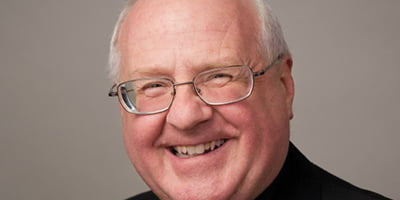
Father Mark Goldasich is the pastor of Sacred Heart parish in Tonganoxie. he has been editor of the Leaven since 1989.
by Father Mark Goldasich
“Father, many times we deal with suffering people, often at a very traumatic time in their lives. How do we minister to them without taking into our own heads and hearts all of their sufferings?”
Thankfully, the question was not directed to me, but to Father David Knight, during a parish mission in Tonganoxie a couple of weeks ago. Without missing a beat, Father Knight said, “Well, the short answer to your question is: Scotch!”
Naturally, he went on to give a serious and thoughtful response to that very good question. Unfortunately, I didn’t hear exactly what that answer was, because I was still chuckling about Father Knight’s off-the-cuff first response.
But I think I know what he probably said. As Christians, we’re called to “manage all of the affairs of Christ on earth.” First and foremost, that means we take time to notice things in the world. We then ask ourselves: What should change? What can I do about it?
In short, we’re called to be “response-able” people, to bring about God’s kingdom on earth. No, we can’t do everything, but we must be willing to do whatever we can.
Particularly in the face of suffering, we often ask the question “why.” We wonder where God might be in all of the hurt or why terrible things happen. We grapple with tragedies like the horrific typhoon in the Philippines, the recent tornadoes in Illinois, the suicide bombing of the Iranian embassy in Beirut, or the daily reports of murders and accidents that make up so much of the local news.
On a more personal level, we experience the death of loved ones, broken relationships, unemployment, hunger, addictions, disillusionment and a host of other ills. In the midst of it all, we wonder where God is and if God cares.
It’s comforting to know that people holier than most of us have asked similar questions. I recently came across a story about the Jesuit priest John Kavanaugh, a philosophy professor and powerful preacher, who went to work for three months as a young priest at the House of the Dying in Calcutta. He was seeking a clear answer about how to spend the rest of his life.
On the first morning there, he met Mother Teresa, who asked, “And what can I do for you?”
The priest asked her to pray for him. “What do you want me to pray for?” she asked.
He voiced the gnawing issue that he’d carried with him since he left the States, “Pray that I have clarity.”
Mother Teresa, in no uncertain terms, replied, “No, I will not do that.”
When he asked why, she said, “Clarity is the last thing you are clinging to and must let go of.”
When Father Kavanaugh commented that she always seemed to have the clar-
ity he longed for, Mother Teresa laughed and said, “I have never had clarity; what I have always had is trust. So I will pray that you trust God.” (Adapted from “More Perfect Illustrations for Every Topic and Occasion,” by Craig Brian Larson and Drew Zahn.)
Following Mother Teresa’s death and the publication of her letters, we now know how true her words were. Although she felt an “absence” of God in prayer throughout her ministry, her life and her work reflected her profound trust in God. She continued to be a “response-able” Christian. She didn’t succeed in providing comfort to every dying person in Calcutta. Nor did she change the caste system in India. But she did what she could: She reached out to the dying in the streets that she came across and founded a religious order to do the same.
We won’t have clarity on this side of heaven, at least as far as answering the question of the problem of evil in the world. But we are all called to trust — not only that God is there with the suffering, but that we are “response-able” to them . . . one tear, one dollar, one hug and one prayer at a time.

